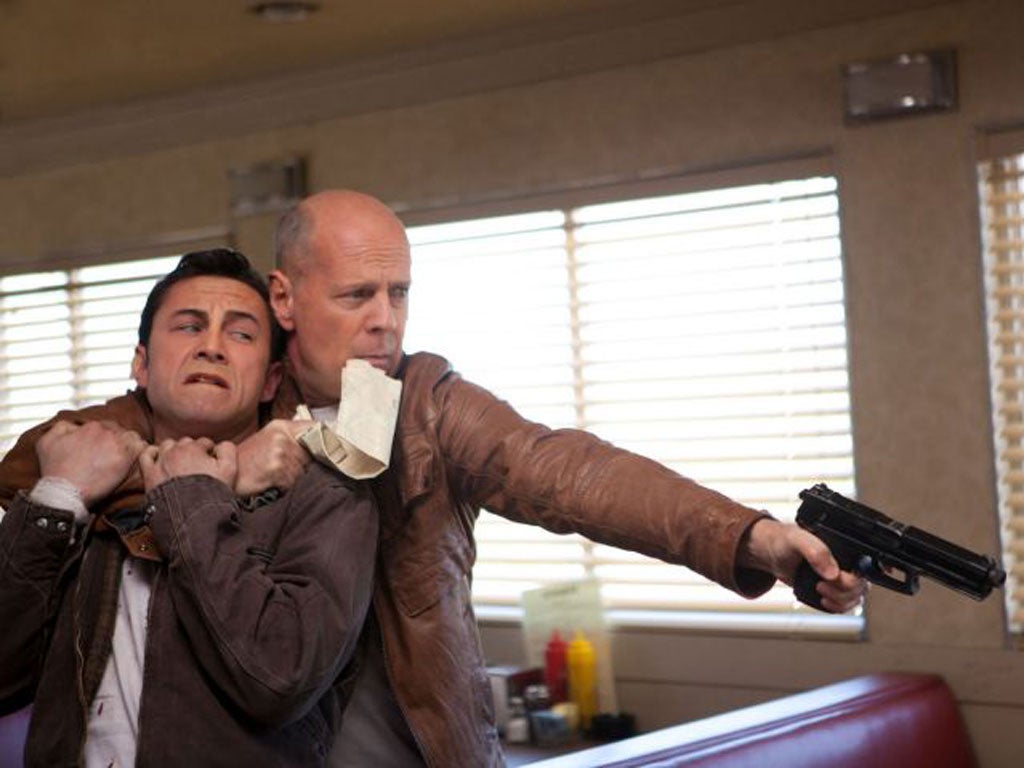Looper, Rian Johnson, 118 mins, (15) / Holy Motors, Leos Carax, 115 mins, (18)
Willis battles his younger self in a sci-fi that's like 'The Terminator' remade by Terrence Malick

Two superior science-fiction films are out this week, both so byzantine that if I recounted their premises in any detail, I'd use up all my space, and would have to steal some from Visual Art. Here, then, are the short versions. The idea of Looper is that the gangsters of 2072 have found a novel way to make their victims vanish without trace: they send them back in time to 2042, where hitmen called loopers are waiting to shoot them and dispose of their bodies. One such looper, Joseph Gordon-Levitt, has no qualms about bumping off these involuntary time travellers – until, that is, he recognises one of his targets. It's his own older self, Bruce Willis.
Yes, you read that correctly: skinny little Joseph and beefy, broad-shouldered Bruce are supposed to be the same person. Gordon-Levitt does a sly imitation of Willis's lopsided smirk and his scratchy drawl, and there's a nice in-joke which sees him peering worriedly at his hairline in the mirror while wearing a Die Hard-issue vest. But his coloured contact lenses and his rubbery facial prosthetics make him resemble a Japanese shop-window dummy more than he resembles Willis. His appearance is so offputting that it might have been preferable if one actor had played both variants of the character, as Willis did in Surrogates.
That issue aside, Looper is a brainy, idiosyncratic, melancholy thriller. Written and directed by Rian Johnson, who made Brick with Gordon-Levitt in 2005, it doesn't keep rushing from one action scene to the next (as in the Total Recall remake), taking its time instead to establish its flawed characters and its grubby, film-noir atmosphere. Indeed, it's a good half-hour before Willis and Gordon-Levitt come face to waxy face. While we're waiting, Looper presents the Kansas City of 2042 as a striking vision of urban decay, where the 1 per cent spend their silver ingots on narcotic eyedrops, and the 99 per cent risk summary execution if they step out of line.
Strangely, it's when Willis shows up that the film loses some of its momentum and originality. We're all geared up for a battle of wits between the two incarnations of the same man. Instead, Gordon-Levitt has a long sojourn on an idyllic farm with Emily Blunt, while Willis stomps around murdering the people who will cause him problems in the future. In its second half, Looper is basically The Terminator as remade by Terrence Malick. It's enjoyable, but less so than either The Terminator or a Terrence Malick film.
Even more loopy than Looper, Holy Motors is Leos Carax's first film since Pola X some 13 years ago. Carax's frequent collaborator, Denis Lavant, stars as Oscar, a mystery man who is chauffeured around Paris in a stretch limousine – shades of David Cronenberg's Cosmopolis. Oscar, it seems, is an actor himself. He has been assigned nine roles to play in turn throughout the day, so he changes his costume and make-up in the back of the limousine, emerges to act out a pre-arranged scenario, and then gets back in the car so that he can be whisked away to his next appointment.
On one level – and it's the kind of film which makes you use phrases like "on one level" – Holy Motors is an anthology of short films, each of them pastiching a different genre. There's an inner-city gangster movie, featuring Oscar as a shell-suited thug. There's a nostalgic melodrama, complete with a chanson sung by Kylie Minogue. And there's a bizarre farce about a grunting troglodyte who abducts a fashion model (Eva Mendes). The remarkable thing is that Carax draws us into the story every time. Thanks in no small measure to the astonishingly versatile Lavant, each discrete episode is so involving that we're thrilled or amused or frightened by it, even though we know that we're watching an actor playing an actor playing a scripted part.
Or are we? Carax keeps us guessing as to whether Oscar is performing for microscopic cameras, or whether he's somehow stepping into numerous alternate universes. Like The Truman Show given an art-house twist, it's a film about the ways that life and entertainment have been muddled together by reality TV and social networking. But it's also a surreal autobiographical reverie (Oscar is Carax's own middle name) about how lonely and wearying it is in the movie business, putting on a front, all day every day, until you're left with no identity of your own. For a film that's so concerned with illusion and pretence, it carries a surprising amount of genuine emotion.
Those are two possible interpretations, anyway. There are probably a dozen more. Holy Motors is accessible and fun, but Carax pulls the rug from under you whenever you think you have it worked out. You won't be sure what to make of it, but you will be sure that it's the most ambitious and stimulating film you've seen in quite a while.
Join our commenting forum
Join thought-provoking conversations, follow other Independent readers and see their replies
Comments
Bookmark popover
Removed from bookmarks